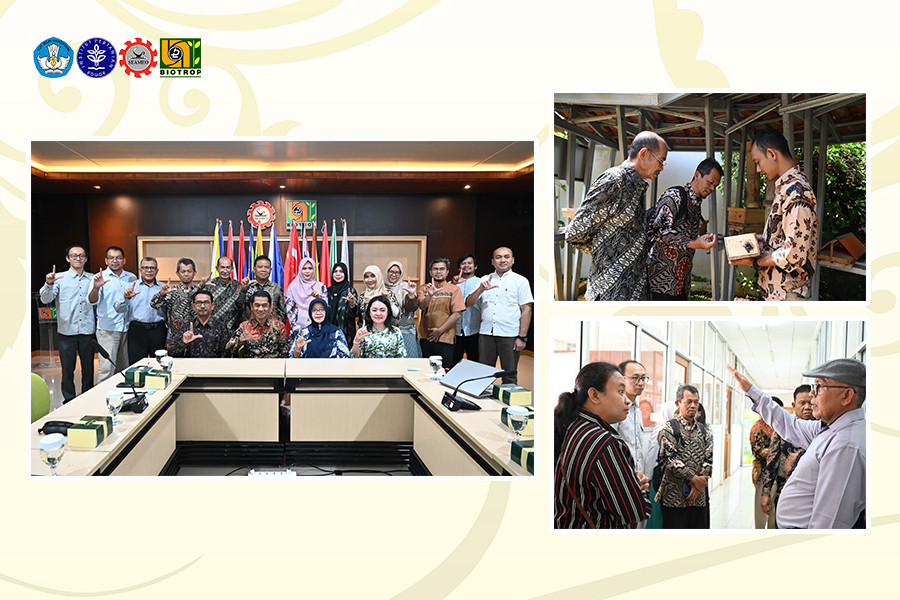On Wednesday, July 31, 2024, SEAMEO BIOTROP and Universitas Samudra Aceh (UNSAM) held a discussion and signed a Memorandum of Agreement (MoA) in the Jati Room at SEAMEO BIOTROP. The event, running from 9:30 AM to 12:00 PM, was attended by Rector Prof. Dr. Ir. Hamdani, MT., faculty members from UNSAM, and the Director and staff of SEAMEO BIOTROP.
This visit marks the beginning of a strategic collaboration between the two institutions in the field of tropical biotechnology research and development. Discussions covered various potential areas of cooperation, including knowledge exchange, joint research, and training programs for students and staff.
The event began with a welcoming speech by Acting Deputy Director for Administration, Ms. Sri Widayanti, M.Si. She expressed gratitude and welcomed the UNSAM delegation: "I would like to thank the Rector and his team for coming all the way from Aceh to visit SEAMEO BIOTROP, not only to sign the cooperation agreement but also to see our facilities."
Dr. Zulhamsyah Imran, Director of SEAMEO BIOTROP, also welcomed the collaboration and thanked UNSAM for their trust: "I want to express my gratitude to Universitas Samudra for their trust in collaborating with SEAMEO BIOTROP. Please take advantage of our various facilities and programs, which are available for both faculty members and students to enhance their capacity in Tropical Biology."
In addition to the discussion and MoA signing, the Rector and his team toured the BIOTROP facilities and shared their impressions afterward. Prof. Dr. Ir. Hamdani remarked, "My impression is that BIOTROP is well-equipped to handle all biodiversity issues in Indonesia, particularly tropical biology. It is impressive to see the diverse range of plants and fish in the tropics and the research and development efforts BIOTROP has undertaken. This facility can significantly contribute to addressing Indonesia's biodiversity challenges, especially with changing weather patterns. This visit should inspire not only Universitas Samudra but all of Indonesia to visit BIOTROP and learn more about tropical biology development."
The positive impression underscores the admiration for BIOTROP's capabilities in addressing biodiversity challenges in Indonesia, particularly in tropical biology. The emphasis is on the research and development conducted by BIOTROP, which is expected to benefit the entire country. The remarks also highlight the hope that institutions across Indonesia, not just Universitas Samudra, will visit BIOTROP to gain insight into tropical biology development. (ydl)
This visit marks the beginning of a strategic collaboration between the two institutions in the field of tropical biotechnology research and development. Discussions covered various potential areas of cooperation, including knowledge exchange, joint research, and training programs for students and staff.
The event began with a welcoming speech by Acting Deputy Director for Administration, Ms. Sri Widayanti, M.Si. She expressed gratitude and welcomed the UNSAM delegation: "I would like to thank the Rector and his team for coming all the way from Aceh to visit SEAMEO BIOTROP, not only to sign the cooperation agreement but also to see our facilities."
Dr. Zulhamsyah Imran, Director of SEAMEO BIOTROP, also welcomed the collaboration and thanked UNSAM for their trust: "I want to express my gratitude to Universitas Samudra for their trust in collaborating with SEAMEO BIOTROP. Please take advantage of our various facilities and programs, which are available for both faculty members and students to enhance their capacity in Tropical Biology."
In addition to the discussion and MoA signing, the Rector and his team toured the BIOTROP facilities and shared their impressions afterward. Prof. Dr. Ir. Hamdani remarked, "My impression is that BIOTROP is well-equipped to handle all biodiversity issues in Indonesia, particularly tropical biology. It is impressive to see the diverse range of plants and fish in the tropics and the research and development efforts BIOTROP has undertaken. This facility can significantly contribute to addressing Indonesia's biodiversity challenges, especially with changing weather patterns. This visit should inspire not only Universitas Samudra but all of Indonesia to visit BIOTROP and learn more about tropical biology development."
The positive impression underscores the admiration for BIOTROP's capabilities in addressing biodiversity challenges in Indonesia, particularly in tropical biology. The emphasis is on the research and development conducted by BIOTROP, which is expected to benefit the entire country. The remarks also highlight the hope that institutions across Indonesia, not just Universitas Samudra, will visit BIOTROP to gain insight into tropical biology development. (ydl)
 Wednesday, 07 August 2024 on 10:27am
Wednesday, 07 August 2024 on 10:27am
